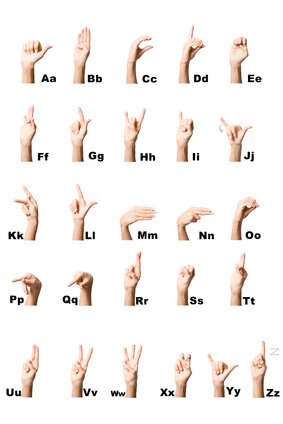 The origin of sign language is just as mysterious as that of spoken languages. It has existed since antiquity. A child that either becomes or is born deaf can quickly learn this language which uses manual communication.
The origin of sign language is just as mysterious as that of spoken languages. It has existed since antiquity. A child that either becomes or is born deaf can quickly learn this language which uses manual communication.
Written languages are based on an alphabet, which is also made up of signs that can be rendered in writing. Indeed, the Internet has enabled people who are deaf or hard of hearing to enjoy greater social independence.
French Sign Language (Langue des Signes Française or LSF)
Forbidden in France until the 1970s, LSF was recognised as a fully-fledged language in the 1980s. The profession became truly professional, with a range of BA and MA degree courses being set up.
French law then recognised the right to use professional sign language interpreters whenever they were needed. Indeed, they can help people who are deaf or hard of hearing receive medical care. A body exists in France, the AFILS (Association Française des Interprètes et Traducteurs en Langue des Signes), which is tasked with promoting LSF, bringing together translators and interpreters and getting the profession recognised (www.afils.fr)
In the French-speaking parts of Canada, visual interpreters use French and Quebec Sign Language (Langue des Signes du Québec or LSQ). You can browse the English website ( J) of the AVLIC (Association of Visual Language Interpreters of Canada)!
International Sign (IS)
International Sign is different to all national sign languages insofar is it incorporates a variety of sign languages, mainly from European countries.
It is primarily used during international conferences for deaf people and events such as the Deaflympics, and has become part and parcel of international discussions.
The matter was first brought up at the World Federation of the Deaf (WFD) in 1951. The Commission of Unification of Signs drew up a list of 1,500 signs in the 1970s.
It is worth noting that is largely dominated by American Sign Language (ASL) and Italian Sign Language (Lingua dei Segni Italiana or LIS).
A lack of interpreters
While 3,000 interpreters would be needed to cover all of the needs of people who are deaf of hard of hearing in France, there are only in fact 400 qualified interpreters available. Only 30 or 40 interpreters qualify every year. The profession therefore has a bright future.
Just like all professional interpreters, LSF interpreters need to be curious, gather information and be able to adapt to different contexts. Like interpreters that render messages orally, LSF interpreters work in all kinds of social situations, lending their services as part of negotiations, conferences, meetings within companies as well as administrative formalities and many other situations.
How LSF is changing in day-to-day situations and within company organisations.
For some years now, major French companies such as Air France, AREVA, Thales, SUEZ, CAPGEMINI and Crédit Agricole have invested in TADEO, a company that has not only created jobs and trains young people in a new profession (that of the “e-transcriber“) but has also successfully put an issue, which ultimately used to boil down to compassion, at the centre of the economic sphere.
TADEO has single-handedly developed software for visualising two modes of communication on a computer, namely interpretation for people communicating in LSF and real-time speech transcription for those who are speaking. Such developments give their professional independence to almost 7 million hearing-impaired people (Source: Le Handicap Auditif en France ministerial study). A number that is growing giving the ageing population and increase in noise pollution. Company employees can now interact with their colleagues and suppliers in a spontaneous manner and establishments open to the public can offer the same services and contacts via the ACCEO solution to all consumers without exception.
CG Traduction & Interprétation welcomes this major step forward and is keen to join in with TADEO’s CSR approach, due to the fact that it shares the same societal DNA, by contributing – if and when it is needed – its linguistic expertise to ensure the international development of its worthy people-focused projects.



Hello!
I’m looking to hire a French Sign Language interpreter who also speaks fluent spoken English for a
If you have anyone in your database, please reach out to me.
Peter
(440) 668-2634